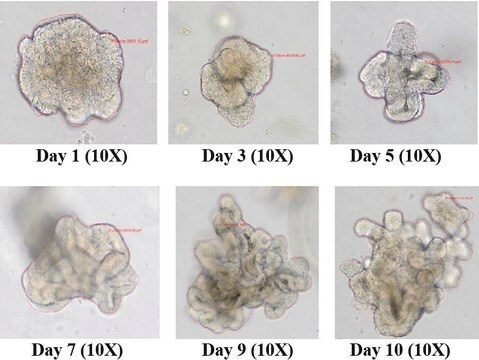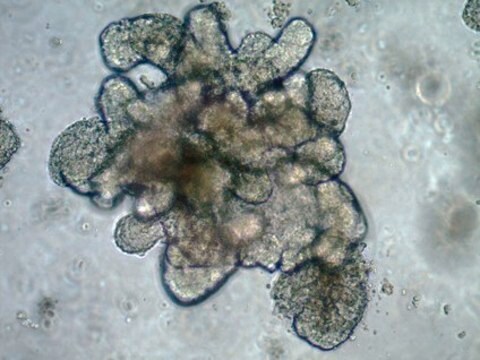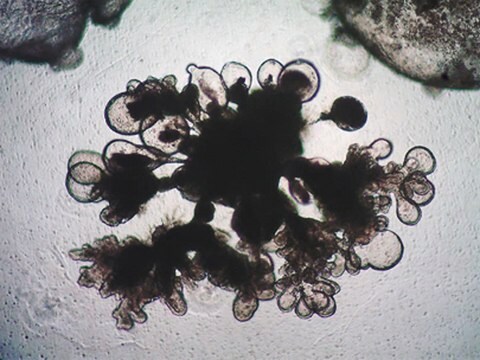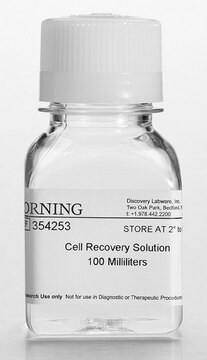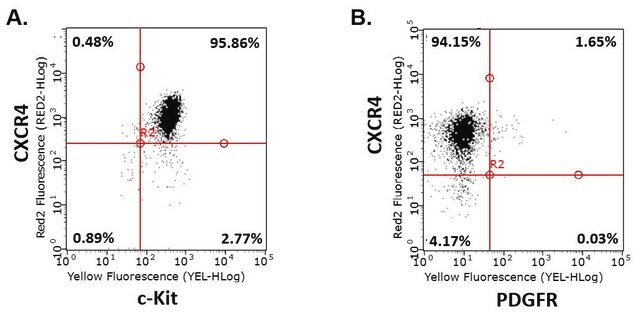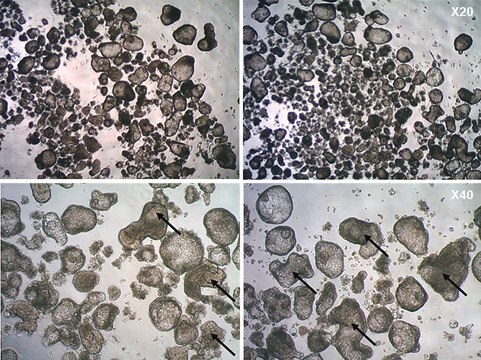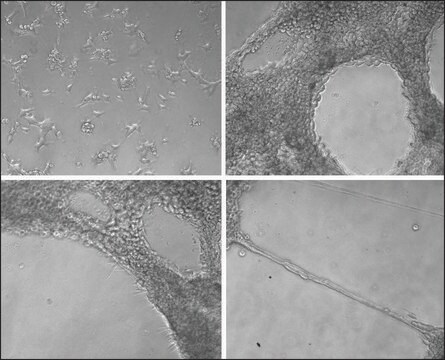추천 제품
형태
liquid
기술
cell culture | stem cell: suitable
관련 카테고리
일반 설명
• Similar composition and architecture to primary tissue: Organoids harbor small population of self-renewing stem cells (such as intestinal crypt stem cells) that can differentiate into cells of all major cell lineages, with similar frequency as in physiological conditions.
• Relevant models of in-vivo conditions: Organoids are more biologically relevant to any model system and are amenable to manipulate niche components and gene expression.
• Stable system for extended cultivation: Organoids can be cryopreserved as biobanks and expanded indefinitely by leveraging self-renewal and the differentiation capability of the stem cell populations.
The 3dGRO Organoid Dissociation Reagent is a proprietary chemically defined enzyme-free dissociation solution used to passage multiple organoid cell types (etc. mouse intestinal organoids, human colon and lung organoids). Due to its chemically defined nature, the reagent produces consistent organoid passaging results. 3dGRO Organoid Dissociation Reagent can be used in combination with the 3dGRO R-Spondin-1 Conditioned Media Supplement (SCM104) to isolate and passage primary intestinal organoids from mice or in combination with the 3dGRO Human iPSC Derived Colon Organoid Expansion Medium (SCM304) to expand human iPSC derived colon organoids (SCC300).
애플리케이션
Cell Culture
Stem Cell Research
품질
Osmolality: 340-370 mOsm
Sterility Tested: No Growth/Pass
Endotoxin; <2 EU/ml
pH: 7.2-7.4
저장 및 안정성
법적 정보
면책조항
Storage Class Code
12 - Non Combustible Liquids
WGK
WGK 2
Flash Point (°F)
Not applicable
Flash Point (°C)
Not applicable
시험 성적서(COA)
제품의 로트/배치 번호를 입력하여 시험 성적서(COA)을 검색하십시오. 로트 및 배치 번호는 제품 라벨에 있는 ‘로트’ 또는 ‘배치’라는 용어 뒤에서 찾을 수 있습니다.
이미 열람한 고객
문서
Human epithelial intestinal colonic organoids can be used as an alternative to Caco-2 drug permeability assays for drug screening and compound toxicity testing.
Human epithelial intestinal colonic organoids can be used as an alternative to Caco-2 drug permeability assays for drug screening and compound toxicity testing.
프로토콜
How to stain organoids? A complete step-by-step protocol for immunofluorescent (IF) and immunocytochemical (ICC) staining of organoid cultures using antibodies
A rapid in vitro assay for CFTR function, the forskolin-induced swelling protocol uses human colon organoids, which can be derived from cystic fibrosis patient tissue.
Highly characterized cryopreserved human colonic organoids and a step-by-step organoid culture protocol for epithelial intestinal organoid differentiation from iPS cells.
자사의 과학자팀은 생명 과학, 재료 과학, 화학 합성, 크로마토그래피, 분석 및 기타 많은 영역을 포함한 모든 과학 분야에 경험이 있습니다..
고객지원팀으로 연락바랍니다.